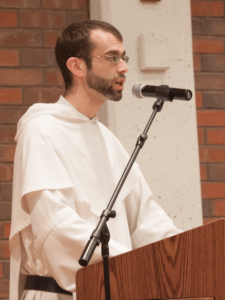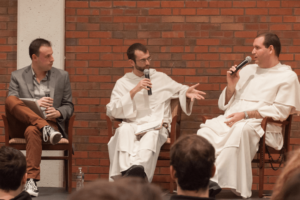by The Cowl Editor on November 9, 2017
News

by Alexandra Huzyk ’20
News Staff
Seventy-five years ago, a political debate was held between Charles De Koninck and Jacques Maritain. The two philosophers were asked to determine the relationship between the common good and the individual good, and explain why they thought one should be prioritized over the other. On Thursday, November 2, a Catholic debate was held in ’64 Hall that presented the same question to Lawrence Gillheeney and Brother Henry Stephan, O.P. The debate was titled: “What Trumps What: The Individual or the Community?”
To start off the event, Father Bonaventure Chapman, O.P., presented the question to the audience and explained the format of the debate. The debate began with each person taking seven minutes to convey their opening statements to the audience.
Br. Stephan asserted that the good of the community should be held above the good of the individual. He stated, “I don’t deny the importance of the individual. Rather, this debate is about understanding why we should rank one over the other.”
Br. Stephan commenced his argument by defining the common good as being “diffusive of its good to several or many people at one time.” He claimed that human beings are, at the root of all things, social and political animals. It is because of these intrinsic qualities that human beings are drawn into communities and networks of people. He stated, “metaphysically, we are drawn to seek what we lack” and often fulfill these gaps in the midst of like-minded people. Br. Stephan finished his opening statement by saying that through the formation of these greater unities, human beings strive to become a part of something bigger than themselves; ultimately, they strive to attain God.

Gillhenney, in contrast to Br. Stephan, argued that the good of the individual should come before the good of the community. Gillhenney took on a rather pessimistic outlook on the capacities of the state. The main premise of his argument was that the state, as an artificial creation of the people, is “incapable of governing the common good.” Thus, the state is unable to provide humans with truth or fulfillment because it is oriented around the objectives of the few. He said that, “power in the hands of the few inevitably leads to corruption. There are too many different ideas,” that will create tensions between individuals and distract people from their mutual goals.
“Preserving the individual good is key to shaping the world to be the kind of place we want to live in,” Gillhenney stated. “Communal institutions,” which are inspired by individuals’ wills to make up for the inefficiency and bias of the state, “will drive the ability to do good beyond the state.” It is communities like non-profit organizations, or religious groups, that Gillhenney thinks will enable people to strive towards truth and justice, not the state.
After Br. Stephan and Gillhenney presented their opening statements, both individuals were given the opportunity to provide a rebuttal and then to cross examine their opponent. Br. Stephan began his rebuttal by arguing that the state is a necessary institution created to preserve the interests of the whole. He asserted, “The state is not an alien good. Because we’ve made the individual a buffered self, the common good seems unintelligible.”
Gillhenney’s rebuttal to Br. Stephan’s statements was quick and to the point. He plainly argued that Br. Stephan did not fully answer the question because he had only addressed the corruption of politics, to which the debate was not focused on. Gillhenney claimed, “It is a mistake to assume politics is the same as the state. The state is a creation of man,” and the reason why humans are prevented from fully attaining the common good.
Following their rebuttals and cross examinations, Fr. Chapman, as the adjudicator, posed a number of questions to both Stephan and Gillhenney in order to clarify and challenge their arguments. Once Chapman was done questioning both individuals, the floor was opened up to the audience for more questions. One student posed a question to Stephan, asking him to “address the ideas of the state as a part of the fallen world.” Stephan replied that, as fallen humans, we are unaware of our perfection and so we must realize that our interests lie within the common good and the community. He concluded that people must continue trying to build a more perfect society.